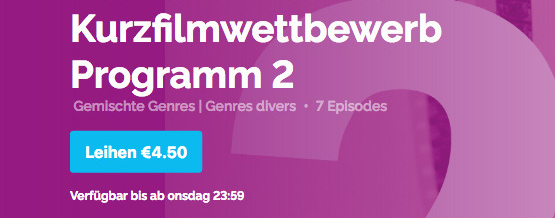Long before the pandemic, film festivals already began to outsource tasks they had dealt with internally prior to this and contract work out to external IT service providers. As digitalisation progressed, the acceptance of film submissions by the festivals was initially spun off in this way. This was then followed by the online provision and screening of films for internal festival viewing and selection purposes. Right now, with the presentation of a festival’s programme only possible on the internet, IT knowledge and skills are being sought for almost all of the festival-related work and digital tools have become a necessity. Service providers that to date were responsible for specific single tasks are expanding their range of services to account for this. They are positioning themselves as aggregators on the market.
At the end of this development, all-inclusive packages should be available for and greatly benefit festivals unable to afford either specialist personnel or the related technology. But for that, such packages are also capable of resulting in a significant loss of control for the same festivals.

Meme ©rww/CC
The providers and the services they offer come from all sides and industry sectors. Especially interesting ones, that are also quite pleasant for me, consist of platforms and applications which have been developed directly from festival work areas. In these cases, staff at festivals have a go at resolving the IT tasks themselves, then become independent and establish their own businesses.
The Eventive VoD and virtual-cinema platform from Memphis, Tennessee, is an example of this. Iddo Patt, a filmmaker and board member of the Indie Memphis Film Festival asked his then 15-year-old son Theo for some help. And Theo Patt created Eventive for him. Last year, Eventive »emerged as the leading global provider of secure, ticketed, on-demand and live streaming of independent film content. For festivals, arthouses and distributors«. More than 700 organisations are already using the services of Eventive. As per their own details, 35,000 ‘virtual screenings’ and 2.5 million ‘successful streams’ have been booked there to date.
Or take the Eventival platform that was founded in 2009 in Prague. The co-founder Tomáš Prášek was the programme coordinator at the Prague International Film Festival prior to this, and then the head of the guest office at the Karlovy Vary Festival. For the latter festival, together with a colleague he developed the first global universal web-based film festival software, which provided the basis for »the world’s No. 1 film festival management software« today. As per their own information, Eventival has more than 135 film festivals as customers.
The Filmchief SaaS application, which is utilised by numerous European short film festivals by now, was created in a similar process. Filmchief was developed by Dennis Pasveer for the Go Short Festival in Nijmegen and KLIK! in Amsterdam. A software developer in the healthcare sector prior to this, Dennis Pasveer – who is himself an animation filmmaker with a fondness for the cinema – founded the company ThisWayUp. Currently, the festival management and viewing app is being further developed as online streaming software, which is due to be officially launched in April with the “This is Short” European Short Film Network (ESFN).
Only Eventival did not develop its own streaming app. But for that, its portfolio of services really does have everything else required for the organisation of a festival. These range from B2B databases and video libraries such as Cinando (Cannes), to platforms like Festhome, DCP creators and service providers such as Cinesend, Vimeo and Shift72, through to ticketing platforms, payment services like PayPal and Stripe, and even mass emailing systems. And Eventive is also counted among its compatible partners. Eventival focuses its efforts especially on the development of interfaces, with which services from other companies can be aggregated – including third-party VoD streamings.
From the other side too, increasing numbers of specialist service providers are entering the market and expanding their core business. Festival Scope in cooperation with Shift72 proved to be the most successful one in 2020, operating as an allrounder for online festivals. Festival Scope first emerged as a B2B platform for the film sector. During the pandemic, however, the company has gained a major boost with its business-to-customer VoD platform. This was achieved thanks to its cooperative work with the New Zealand-based company Shift72, one that occurred more by chance. The two firms encountered each other when at the start of 2020 they were fulfilling contracts independently from each other for CPH:DOX, one of the first pandemic-affected festivals to be organised and held online.
Shift72, which was originally a B2B company for film marketing services and secure streams ordered by film distributors and cinemas, is the largest provider of online festival services today and reported 400% growth in August 2020.
Likewise, submission platforms are now entering the online festival business. The Festhome platform, for instance, which was originally Spanish, has expanded its indiehomeTV streaming service into a global online festival platform (»The only platform created especially for online film festivals«) – with its headquarters now in Newark, USA. In the process, Festhome has been able to benefit from its contacts in the film submissions area. As I write this piece, the short film festivals screening programmes there include Tampere (currently with a programme from the AV-arkki Association) and the German Bamberger Kurzfilmtage festival (»1 Festival 30 Weeks 100 Films«).
Outsourcing, Spinning-Off, Subcontracting – and Losing Control
In an ideal world, each festival would select its own – perhaps local – internet provider, its own festival management app, its streaming channels, and a scalable content delivery network. And this is the only way that permits corporate identity and branding identity – also as cultural concepts and ethical values – to be optimally conveyed to the outside world.
However, this is far too complex and costly for film festivals, and especially for those that assume this shifting of the festivals to the internet is only a temporary necessity (until we have sufficient ‘vaccination coverage’). And it is understandable that so many festivals are now opting for out-of-the-box solutions that bundle together all the services required, rather than concluding contracts with a dozen different service providers. But avoiding this complexity and its related costs comes at a price.
The on-demand online services awarded to and provided by aggregators differ only minimally from each other from festival to festival, both visually and in terms of how they work. So much so that even the same bugs are consistently visible on all of them. One more harmless but still telling example of this was: On the homepages of festivals from various countries the weekdays were consistent, but named incorrectly in Danish.

Wednesday/onsdag Bug, Screenshot
The price that festivals ‘pay’ for external aggregated solutions includes a loss of control over the digital methods and technical resources that are used and applied. For which reason, one should always initially inform oneself, at least if you have your own ideas in mind about what constitutes ‘good practice’ and your festival’s integrity is at stake.
Worth Knowing – Questions That Can Arise
With some providers, services and features are bought from them in an overall package that are not required at all. When, for instance, a festival has decided on having geo-blocking, there is no need to have the festival films available in a global network of data centres. And if sustainability and climate protection are integral to a festival’s self-image, then it is also not necessary to transmit films around the world from server farms in Seattle, Sidney or Beijing. By now, videos have already become the SUVs on the data highways anyway[1]. And as delivery networks and end consumers procure their electricity from different sources, there is also nothing to gain from hosting your own festival website in verdant Freiburg, for instance, with it running climate neutrally on green electricity.
The location is, however, more than just a question of ‘political correctness’ and ‘compliance’. The data streams of almost all the major service providers flow via data centres in the USA and/or China – countries with the highest consumption of ‘dirty energy’ and to some extent loose or even dubious data protection and privacy regulations. As an international festival, one should consider whether you are compromising your guests, who are perhaps regarded as members of the opposition in their home country. Many German short film festivals seem to have recognised this issue and award contracts to providers and servers that operate under EU or German directives, such as for instance to the Stiftung kulturserver.de foundation, which uses data centres from Hetzner (Germany).
When aggregators are contracted, our options for choosing and exerting influence diminish. Even simple processes such as the management of a user account can slip beyond our control, as I myself have experienced. After visiting a festival, I requested to have my profile deleted that, in addition to the contact and bank details, also contained information about events visited (online ticketing) and colleagues contacted (online networking). Only after pressing the festival office repeatedly to do so did I learn that they were not able to, and that I would have to address my concerns to an aggregator in a third country.
Such service providers even aggregate so-called intelligence data about festivals, or in other words, knowledge that previously ‘belonged’ only to the festival organisers.
Retaining Key Competencies
It is part of the business model and raison d’être of aggregators to constantly expand and augment their portfolio of services so as to increase their added value. They combine technical services with digital marketing, with the management of intelligence data and content procurement, and over the long-term, curatorial offers will probably be included as well. Beyond doubt, this is advantageous for film festivals, but it is also double-edged. Festival organisers have the expertise and knowledge of ‘how to do festivals’, how they are organised and held – but only in the physical world. For this reason, as with any outsourcing, it is essential to take care not to slip into a situation of dependence and spin-off one’s own key competencies in the process as well.
Links
URL Eventive
URL Eventival
URL Festhome
URL Festival Scope
URL Filmchief
URL Shift72
[1] According to a study from 2015 (The Shift Project, 2015) ten minutes of HD video streaming on a smartphone consumes just as much energy as a 2-kilowatt cooker on at its highest level for five minutes. On a 4K screen this is significantly more. »Admittedly, these aren’t the major power guzzlers, that’s the server farms and networks (…). Video files account for 80 percent of all the information transmitted. Three-quarters of this is allocable to four major formats: Video-on-demand, pornography, ‘tubes’ und social networks. As per a calculation by the University of Bristol, each year more than 50 million tons of CO2 are pumped into the air for this.« https://www.heise.de/tp/features/Stromfresser-Internet-4776573.html
»In 2018, online video viewing generated more than 300 MtCO2, i.e. as much greenhouse gas as Spain emits.« (Shift Project 2019). https://theshiftproject.org/en/article/unsustainable-use-online-video/
Note: The latter study from late 2019 is the most recent on this topic. Unfortunately, there are too few studies or public commissioners of studies. The large providers block information about server locations and energy consumption, but at the same time are very active in greenwashing.
Caution: Some ‘European’ aggregators, however, only have their administration in one EU country and use foreign services, for which the EU laws, to which the aggregator likes to refer in the general terms and conditions or privacy obligations, do not apply. Attention must also be paid to letterbox companies and companies ‘based’ in tax havens.
1 Trackback